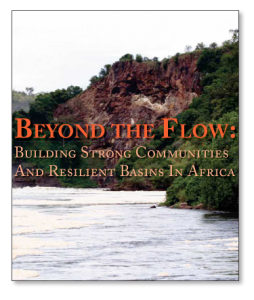Effective management of water resources is a complicated task. It requires attention not only to the wide variety of water users and uses, but also the ecosystems through which water functions and moves.
In Africa, for example, the Nile Basin encompasses more than three million square kilometres in no less than 11 countries. It is home to 238 million people. Increasing their engagement in the management of the basin is the goal of the multinational NGO, Nile Basin Discourse (NBD), one of twelve members of the AfriWater Community of Practice (CoP) which was formed in 2014 with the support of Both ENDS. In six basins in East and West Africa, members of the AfriWater CoP are actively enhancing participation of communities in IWRM processes using the Negotiated Approach. They are also using an ecosystem perspective which integrates management of water with that of land and other resources for the purposes of both sustainable use and conservation.
In 2015, AfriWater CoP members shared their perspective with policymakers, pressing for full implementation of the policy framework Africa Water Vision 2025, which outlined the coordinated development and management of water, land, and related resources geared toward equitable and sustainable use. In 2015, AfriWater CoP caught the attention of key decision-making bodies and stakeholders, including the African Ministers’ Council on Water (AMCOW), which acknowledged the value of the network’s perspective on river basin management.
At the World Water Week in Stockholm, Serah Munguti, from AfriWater CoP member Nature Kenya, addressed a meeting of international donors, sharing the group’s remarkable success story in the Tana River Delta: the group’s efforts to raise awareness about the risks of proposed biofuel production in the area ultimately resulted in a comprehensive land and water use plan.
Along the way, the group succeeded in securing designation of the Tana River Delta as a Wetland of International Importance under the Ramsar Convention. This inspirational case is one of several featured in AfriWater CoP’s report, Beyond the flow: Building strong communities and resilient basins in Africa, published in October with the support of Both ENDS.
AfriWater CoP also developed fruitful relationships with the UNESCO-IHE Institute for Water Education and the African Network for Basin Organizations (the regional network of local water authorities). In 2015, the network was involved in project proposals with both groups. The AfriAlliance proposal, led by UNESCOIHE, was awarded funding from the European Union’s Horizon 2020 research and innovation programme. The project, which will run from 2016 to 2021, involves 16 EU and African partners, including scientists, decision-makers, practitioners, and other key stakeholders who will work together in the areas of water innovation, research, policy, and capacity development. AfriWater CoP is the consortium’s only civil society organisation, and brings to the table its unique expertise in ensuring bottom-up community involvement in water management.

